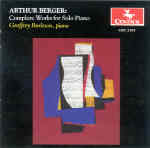Arthur Berger’s low-key yet formidable presence on the American musical scene spans more than 60 years as an educator, writer, and composer. While piano music is not central to his creative output, Berger truly understands the instrument’s inner and outer workings. His earlier Episodes, Fantasy, Rondo, Three Bagatelles, and Partita take their cue from Copland’s airy neo-classical harmonic language, and often make their terse expressive points through combined sustained and percussive articulations and unexpected accents. The three One-Part Inventions are marvelous studies in displacing unison melodies and sometimes doubling them all over the keyboard’s compass. The tiny Birthday Cards derive pitch material from their subjects’ names (such as Elliott Carter, Gunther Schuller, and Leon Kirchner).
The Five Pieces for Piano, written in 1969, constitute Berger’s major keyboard opus and represent his highly concentrated serial style at its most engaging. Geoffrey Burleson plays them a shade quicker and more transparently than the late Robert Miller’s more dynamic, granitic readings on New World. Elsewhere, Burleson’s lean, incisive pianism and caring musicianship manifest themselves in every bar. The sonics are flinty and bathed in resonance both real (the Little Center in Worcester, Massachusetts) and artificial (the selections recorded at Joseph Patrych’s intimate, dry studio). Burleson’s annotations discuss the composer and his works in scholarly and articulate detail.
































